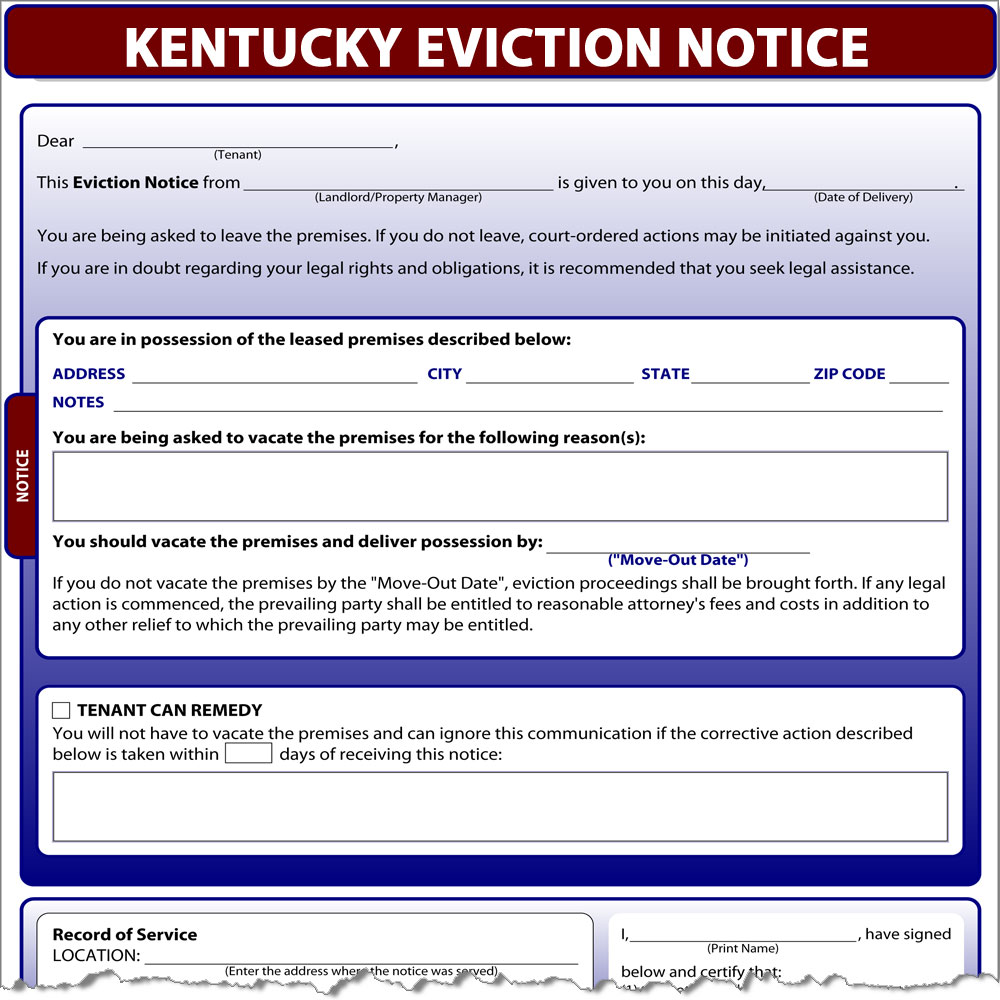Navigating the Eviction Notice Process in Kentucky
Evicting a tenant is a complex process that needs a landlord to
follow along with regulations stringently. As a landlord, understanding
the basic principles of a Kentucky eviction notice is a must when
evicting a tenant. The eviction notice may be the first faltering step
in the eviction process and serves as a legal document that notifies the
tenant of these default and what they need to do to treat the
situation. This informative article offers an breakdown of the kentucky eviction notice to simply help landlords understand the procedure better.

Kinds of Eviction Notices in Kentucky:
In Kentucky, eviction notices are of two types: Pay Rent or Quit and Cure or Quit. A Pay Rent or Quit notice requires the tenant to pay for the rent within 7 days or vacate the premises. A Cure or Quit notice requires the tenant to treat a breach of the lease or vacate the premises. The Cure or Quit notice gives tenants between ten and 14 days to treat any breach of the lease. If the violation is of a dangerous or criminal nature, the landlord can issue an Unconditional Quit Notice requiring the tenant to vacate the premises within seven days.
Serving the Eviction Notice:
It's vital to serve the eviction notice to the tenant lawfully. The notice can be served personally to the tenant, left with a household person in suitable age and discretion, or sent via certified mail, return receipt requested. If the tenant can't be found, the eviction notice could be posted on the rental unit's door. The landlord must allow sufficient time for the tenant to get the notice and act accordingly.
Tenant Response to the Eviction Notice:
After receiving the eviction notice, the tenant has the best to respond in writing within the specified time frame. If a Pay Rent or Quit notice is issued, the tenant has seven days to cover the rent or vacate the premises. If a Cure or Quit notice is issued, the tenant has between ten and 14 days to treat the breach ahead of the landlord can file an eviction lawsuit. If the tenant doesn't respond within the specified time frame, the landlord can apply for eviction in court.
The Eviction Process:
If the tenant fails to respond to the eviction notice or doesn't cure or pay within the specified time frames, the landlord may file an eviction lawsuit with the court. The landlord must provide proof of the default and proof the notification of the eviction notice to the tenant. If the court finds and only eviction, the tenant has 7 days to vacate the premises. If the tenant doesn't leave, the landlord can obtain a writ of possession and have the sheriff enforce the eviction.
Retaliation:
Retaliation by a landlord is illegal and may result in fines and penalties. Retaliation identifies a landlord issuing an eviction notice since the tenant has exercised certain lawful rights, such as filing a complaint from the landlord. The tenant has the best to improve retaliation as a defense in an eviction lawsuit and may be awarded damages if the court finds in their favor.

Conclusion:
Evicting a tenant can be a complex and time-consuming process. However, by having an comprehension of the basic principles of a Kentucky eviction notice, landlords can ensure they follow the law and avoid legal repercussions. It is vital to serve the notice lawfully, supply the tenant sufficient time to respond, and initiate legal proceedings if necessary. Additionally, retaliation with a landlord is unlawful and may result in penalties. Understanding these basics could make the eviction process less stressful and ensure the landlord's rights and responsibilities are fulfilled.
Comments
Post a Comment